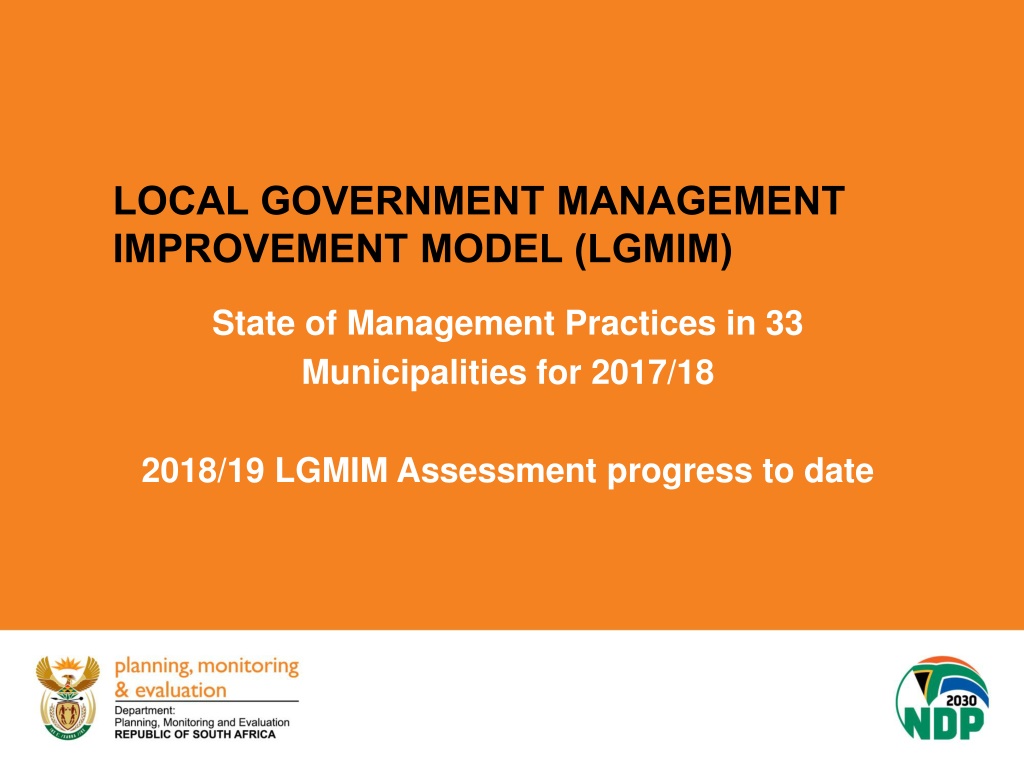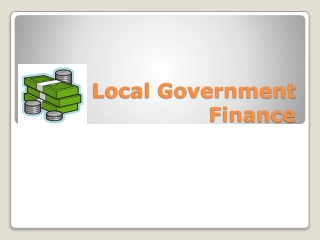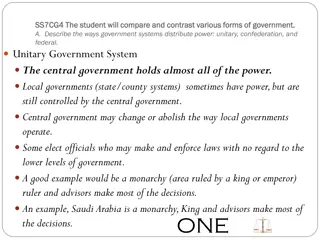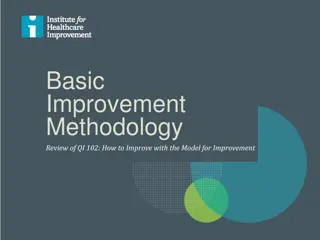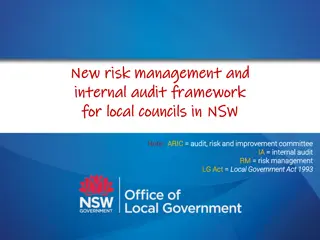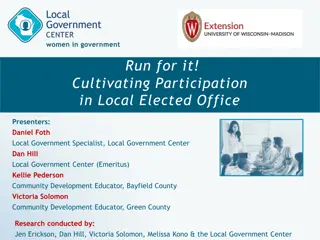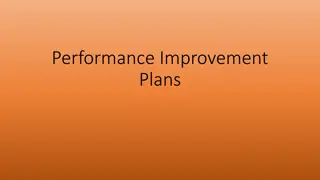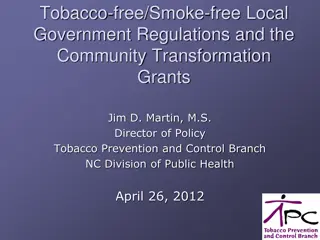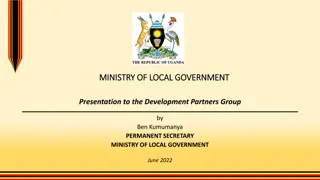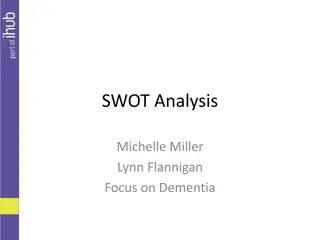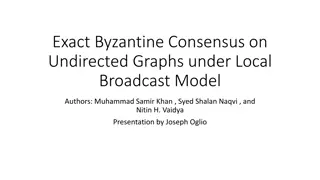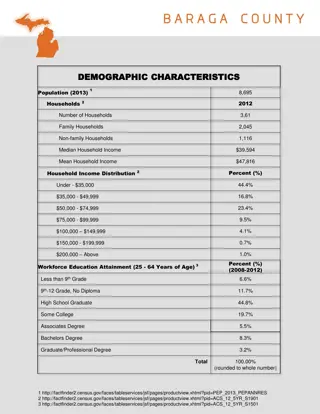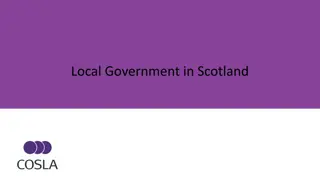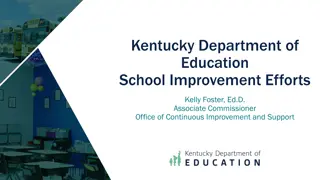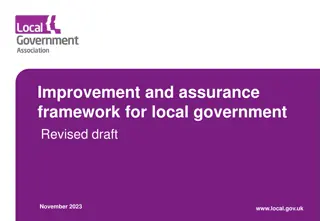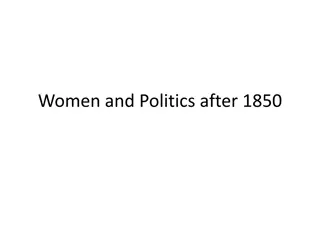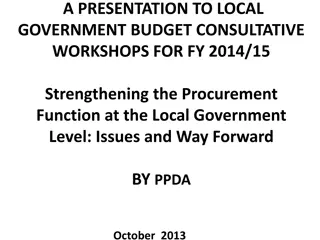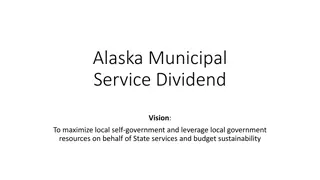Local Government Management Improvement Model (LGMIM) Assessment Overview
The Local Government Management Improvement Model (LGMIM) assesses managerial practices in municipalities to enhance service delivery, productivity, and management capabilities. It covers key performance areas such as Integrated Development Planning, Service Delivery, Human Resource Management, Financial Management, Community Engagement, and Governance. The assessment measures performance levels based on adherence to legal and best practice standards. The presentation discusses the LGMIM concept, findings, progress, and desired results for 2017/18 and 2018/19.
Download Presentation

Please find below an Image/Link to download the presentation.
The content on the website is provided AS IS for your information and personal use only. It may not be sold, licensed, or shared on other websites without obtaining consent from the author. Download presentation by click this link. If you encounter any issues during the download, it is possible that the publisher has removed the file from their server.
E N D
Presentation Transcript
LOCAL GOVERNMENT MANAGEMENT IMPROVEMENT MODEL (LGMIM) State of Management Practices in 33 Municipalities for 2017/18 2018/19 LGMIM Assessment progress to date
What this presentation covers: LGMIM Concept 2017/18 Enrolments 2017/18 Heat maps LGMIM findings per KPA 2018/19 Assessment progress to date Conclusion 2
WHAT LGMIM DOES? Desired Results: Quality of service delivery & productivity Workplace capabilities Management practices Considers and focuses on the managerial practices of a municipality. That is to determine what the organisation does and how it approaches its tasks to achieve the desired results How? By analysing how the organisation works & assesses this against agreed management performance standards and criteria 3
LGMIM Key Performance Areas, and Standards 1.Integrated Development Planning and Implementation 1.1 Integrated Development Planning 1.2 Service delivery implementation, monitoring and reporting 2. Service Delivery 2.1 Access to free basic services 2.2 Water and sanitation services/ facilities 2.3 Performance against Municipal Strategic Self- Assessment (MuSSA) 2.4 Management of waste disposal sites (landfill sites) 2.5 Refuse removal 2.6 Public lighting / household electrification 2.7 Distribution, operation, maintenance and refurbishment of the municipal electricity infrastructure 2.8 Municipal road network 3. Human Resource Management 3.1 Application of prescribed recruitment practices 3.2 Implementation of prescribed performance management practices for the MM and section 56 managers
LGMIM Key Performance Areas, and Standards (Cont.) 4. Financial Management 4.1 Effective budget planning and management 4.2 Management of unauthorised, irregular and/or fruitless and wasteful expenditure 4.3 Revenue management 4.4 Supply Chain Management 5. Community Engagement/ Participation 5.1 Functionality of ward committees 5.2 Service standards and complaints management 6. Governance 6.1 Assessment of accountability mechanisms (MPAC) 6.2 Response to external audit findings 6.3 Assessment of Internal Audit 6.4 Assessment of Audit Committee 6.5 Assessment of policies and systems to ensure professional ethics 6.6 Prevention of fraud and corruption 6.7 Risk management 6.8 Administrative, operational and financial delegations
How is performance measured? Level Description Level 1 The municipality lacks basic adherence to management practices in line with legal, regulatory and prescribed best practice requirements. Affected management standard requires serious attention from the management team. Level 2 The municipality has some management practices in place that partially adhere to legal, regulatory and prescribed best practice requirements. A platform exists to become fully effective, but will require some attention from the management team. Level 3 The municipality employs management practices in line with legal, regulatory and prescribed best practice requirements. The municipality is fully effective and the management team should endeavour to sustain the good performance. Level 4 The municipality employs management practices in line with legal, regulatory and prescribed best practice requirements and shows innovation. The municipality is commended for this achievement and encouraged to sustain the outstanding performance. 6
The LGMIM Journey LGMIM launch Self Improve assessment Feedback & Review Moderation 7
Fraud & corruption 2 2 2 1 2 3 3 3 2 3 2 4 2 2 1 2 1 2 3 2 2 4 2 3 2 2 1 4 2 3 1 1 1 Risk management 2 2 2 1 1 3 1 2 2 1 1 3 2 2 1 1 1 2 3 2 1 4 2 2 1 2 1 3 2 2 2 2 3 Audit committee 3 4 2 3 1 1 1 2 2 2 2 2 1 2 2 2 2 2 2 2 2 2 3 1 1 2 2 2 2 2 2 1 2 Electricity disbn Audit findings 1 1 3 2 1 1 1 1 1 1 1 3 1 2 2 2 3 3 3 4 4 1 1 1 2 2 1 2 2 1 1 2 1 Electrification Internal audit 2 1 2 2 2 3 2 2 1 1 2 2 2 2 2 2 1 2 2 2 2 2 2 2 2 2 2 2 2 2 3 1 3 Recruitment 3 N/A N/A N/A N/A N/A 1 1 2 3 N/A N/A N/A N/A N/A 3 N/A N/A N/A N/A N/A 1 3 N/A 1 3 N/A 3 3 1 1 N/A 1 Delegations 3 4 3 1 2 1 1 1 2 3 1 1 3 3 2 3 3 1 3 3 1 3 1 3 1 1 2 3 3 1 1 3 1 UIF&W exp 2 1 3 1 1 1 1 1 1 1 1 1 1 1 1 1 1 1 3 1 1 3 1 2 1 1 3 1 3 3 2 1 1 Prof ethics 3 1 4 2 1 2 1 2 2 3 1 3 3 1 1 3 1 1 1 1 1 1 2 1 2 3 1 3 3 2 3 1 1 Transport 2 1 1 1 1 2 1 1 1 1 1 1 1 1 1 1 1 1 1 1 1 1 1 1 1 1 1 1 2 1 1 1 1 Revenue 2 1 2 1 1 1 2 1 2 2 1 2 1 1 N/A 2 2 1 2 2 2 2 1 1 1 1 1 N/A 2 1 1 1 N/A MuSSA Budget 1 1 1 1 1 1 1 1 1 4 1 1 1 2 1 1 1 1 1 1 4 1 1 1 1 1 1 1 3 1 1 1 1 Refuse SDIMR 1 2 2 2 2 2 2 4 2 1 2 2 2 2 2 3 2 2 4 2 2 4 1 1 1 2 2 4 4 2 2 1 1 Waste MPAC 1 2 3 2 2 4 3 3 2 1 1 1 1 1 1 2 1 1 1 1 1 2 1 1 1 1 1 2 1 2 1 1 2 SSCM 3 1 1 2 3 1 3 1 1 1 1 1 1 1 1 1 1 1 1 1 1 3 1 1 1 2 1 3 3 1 1 1 1 PMP 1 1 4 1 1 1 1 1 2 2 1 2 2 2 2 2 2 1 3 2 1 3 1 1 1 1 2 2 1 2 2 2 1 SCM 1 1 1 1 1 1 1 1 1 1 1 1 1 1 1 1 1 1 1 1 1 1 1 1 1 3 1 1 1 1 1 2 1 FBS 2 1 3 3 3 2 3 2 2 2 3 2 3 1 N/A 1 2 2 3 3 1 3 1 1 1 1 3 N/A 3 4 3 1 N/A IDP Amathole Chris Hani Emalahleni Enoch Mgijima Great Kei Intsika Yethu Joe Gqabi Mbhashe Ngqushwa Port St Johns Sakhisizwe Kopanong Letsemeng Mohokare Xhariep Amajuba Dannhauser Emadlangeni Ugu uMuziwabantu Umzumbe Ephraim Mogale Greater Giyani Makhuduthamaga Mopani Vhembe Mbombela Ehlanzeni Nkomazi Thaba Chweu Ga-Segonyana Gamagara John Taolo Gaetsewe 3 1 3 1 1 1 1 2 1 4 1 1 1 1 1 2 2 1 2 1 1 2 1 1 1 1 2 2 1 3 1 1 1 1 2 N/A N/A 2 1 2 3 N/A 1 1 2 1 1 1 1 N/A N/A 2 N/A N/A 1 N/A 1 2 1 N/A N/A 2 N/A 1 1 2 2 N/A N/A N/A 3 2 2 4 N/A 2 1 3 1 2 1 2 N/A N/A 2 1 N/A 1 1 1 2 1 N/A N/A 2 N/A 1 2 3 3 N/A N/A N/A 1 1 3 1 N/A 1 1 1 1 2 1 1 N/A N/A 1 1 N/A 1 1 3 1 1 N/A N/A 1 N/A 1 3 2 3 N/A N/A N/A 1 2 2 N/A N/A N/A N/A N/A 1 N/A 1 N/A N/A N/A N/A 1 N/A 1 N/A 2 N/A N/A N/A N/A 1 N/A 1 2 1 1 N/A N/A N/A N/A N/A 2 N/A N/A N/A N/A 2 1 2 N/A 2 N/A N/A 2 N/A N/A N/A N/A N/A 1 1 2 N/A 2 1 1 2 N/A
Fraud & corruption Risk management Audit committee 3 4 Electricity disbn Audit findings Electrification Internal audit Recruitment 3 N/A N/A N/A N/A N/A Delegations 3 4 3 UIF&W exp Prof ethics 3 Transport Revenue MuSSA Budget Refuse SDIMR Waste MPAC SSCM 3 PMP SCM FBS IDP Amathole Chris Hani Emalahleni Enoch Mgijima Great Kei Intsika Yethu Joe Gqabi Mbhashe Ngqushwa Port St Johns Sakhisizwe Kopanong Letsemeng Mohokare Xhariep Amajuba Dannhauser Emadlangeni Ugu uMuziwabantu Umzumbe Ephraim Mogale Greater Giyani Makhuduthamaga Mopani Vhembe Mbombela Ehlanzeni Nkomazi Thaba Chweu Ga-Segonyana Gamagara John Taolo Gaetsewe 3 N/A N/A N/A N/A 3 N/A N/A N/A N/A 3 3 3 3 N/A N/A N/A N/A 4 3 3 3 4 3 3 3 3 4 N/A N/A N/A N/A N/A 4 3 3 3 3 3 3 3 3 N/A N/A N/A 3 4 N/A N/A N/A N/A 4 3 3 4 3 3 3 3 N/A N/A N/A N/A N/A 3 N/A N/A N/A N/A N/A N/A 3 3 3 4 3 3 3 3 N/A N/A N/A N/A N/A N/A N/A N/A N/A N/A N/A N/A N/A 3 3 3 3 N/A N/A 3 3 3 4 4 N/A N/A 4 3 3 N/A N/A N/A 3 3 3 3 3 3 N/A N/A N/A N/A N/A N/A N/A 4 4 3 3 3 3 3 4 4 3 N/A N/A N/A N/A 3 3 N/A 3 3 N/A N/A N/A N/A N/A N/A 3 3 3 3 N/A 3 3 3 4 4 N/A 3 4 3 N/A N/A N/A N/A N/A N/A 3 3 3 3 4 3 3 3 3 3 3 3 3 3 3 3 3 3 3 N/A 3 N/A N/A N/A N/A N/A N/A N/A 3 3
KPA 1: INTEGRATED DEVELOPMENT PLANNING AND IMPLEMENTATION KPA 1: Integrated Development Planning and Implementation 25 20 15 10 5 0 IDP SDIMR Level 1 22 7 Level 2 7 20 Level 3 3 2 Level 4 1 4 Level 1 Level 2 Level 3 Level 4 This KPA comprises of two standards namely: Standard 1.1: Integrated Development Planning Standard 1.2: Service Delivery Implementation, Monitoring and Reporting
KPA 2: SERVICE DELIVERY KPA 2: Service Delivery 35 30 25 20 15 10 5 0 FBS MuSSA Waste Refuse Electrification Electricity disbn Transport Level 1 9 6 12 9 17 9 30 Level 2 8 9 8 9 2 4 3 Level 3 12 0 1 4 4 0 0 Level 4 1 0 0 1 0 0 0 N/A 3 18 12 10 10 20 0 Level 1 Level 2 Level 3 Level 4 N/A The Service Delivery KPA is monitored through eight standards dealing with the planning, project packaging, budgeting and monitoring of: Standard 2.1: Access to free basic services Standard 2.3: Moderated Performance against Municipal Strategic Self-assessment (MuSSA) Standard 2.4: Waste handling Standard 2.5: Refuse removal Standard 2.6: Extension of electricity Standard 2.7: Distribution, operation, maintenance and refurbishment of the municipal electricity infrastructure Standard 2.8: Municipal road system
KPA 3: HUMAN RESOURCE DEVELOPMENT KPA 3: Human Resource Management 20 18 16 14 12 10 8 6 4 2 0 Recruitment PMP Level 1 7 16 Level 2 1 14 Level 3 7 2 Level 4 0 1 N/A 18 0 Level 1 Level 2 Level 3 Level 4 N/A The Human Resource Management KPA is monitored through two standards: Standard 3.1: Standard 3.2: the Municipal Manager (MM) and Section 56 Managers (Managers reporting directly to the MM). Application of Prescribed Recruitment Practices Implementation of prescribed Performance Management Practices for
KPA 4: FINANCIAL MANAGEMENT KPA 4: Financial Management 35 30 25 20 15 10 5 0 Budget UIF&W exp Revenue SCM Level 1 29 24 17 31 Level 2 1 3 13 1 Level 3 1 6 0 0 Level 4 2 0 0 0 N/A 0 0 3 0 Level 1 Level 2 Level 3 Level 4 N/A The Financial Management KPA is monitored through seven standards dealing with: Effective Budget Planning and Management Management of Unauthorised, Irregular and/or Fruitless and Wasteful Expenditure Revenue Management SCM
KPA 5: COMMUNITY ENGAGEMENT/PARTICIPATION KPA 5: Service Standards and Complaints Management 30 25 20 15 Level 1 Level 2 10 Level 3 5 0 1 Level 1 25 Level 2 2 Level 3 6 The Community engagement/participation KPA is monitored through by: Standard 5.1: respectively Standard 5.2: Service Standards and Complaints Management
KPA 6: GOVERNANCE KPA 6: Governance 30 25 20 15 10 5 0 MPAC Audit findings Internal audit Audit committee Prof ethics Fraud & corruption Risk management Delegations Level 1 20 17 5 7 16 7 11 14 Level 2 9 9 25 22 7 16 16 4 Level 3 3 5 3 3 9 7 5 14 Level 4 1 2 0 1 1 3 1 1 Level 1 Level 2 Level 3 Level 4 The Governance KPA is monitored through eight standards dealing with: Assessment of Accountability Mechanisms: MPAC Assessment of responses to External Audit Findings Assessment of Internal Audit Assessment of the Audit Committee Assessment of Policies and Systems to ensure Professional Ethics Prevention and combatting of Fraud and Corruption Risk Management Administrative and Financial Delegations
2018/19 LGMIM Assessment Progress to date August 2018 Enrollment of municipalities September 2018 Training of provinces and municipalities October/November 2018 Initial Self Assessments completed December 2018 / January 2019 Moderation of Initial Assessments completed (37 assessments) February 2019 Moderated Assessments being reviewed by municipalities March 2019 Finalization of scorecards April 2019 Narrative reports per municipality completed and distributed May / June 2019 Trend analysis and drafting of overall report
2018/19 LGMIM Enrolments: Ba-Palaborwa Collins Chabane Fetagomo Tubatse Lephalale Msukaligwa Dr Pixley Ka Isaka Seme Emakhazeni Lekwa Hantam Kamiesberg Karoo Hoogland Khai-Ma Nama Khoi Namakwa DM Richtersveld Masilonyana Moqhaka Ngwathe Tokologo Tswelopele Abaqulusi Alfred Duma eDumbe eThekwini Inkosi Langalibalele Mkhambathini Mpofana uMgeni Elundini Engcobo Inquza Hill Inxuba Yethemba Matatiele Ndlambe Ntabankulu Senqu Umzimvubu
Fraud & corruption 2 3 3 1 3 2 1 3 3 4 4 3 3 1 2 2 3 2 3 1 1 3 1 3 3 1 3 2 1 1 3 3 3 2 3 3 2 Risk management 2 2 2 1 2 2 2 2 3 2 2 2 3 1 2 1 1 1 3 1 2 2 1 2 1 1 2 2 1 1 1 1 2 2 3 1 1 Audit committee 1 2 2 1 1 2 3 2 1 2 1 1 1 1 1 1 1 1 1 1 1 2 2 1 1 1 2 2 1 1 1 1 2 1 2 1 1 Electricity disbn 2 1 3 MUNICIPALITY Audit findings 1 1 1 1 1 3 1 1 1 1 1 1 1 1 1 1 1 1 1 1 1 1 1 1 2 1 1 1 1 1 3 1 1 1 1 2 1 Internal audit 2 3 1 1 1 2 2 1 1 2 2 2 1 1 1 1 1 1 2 2 2 2 1 3 1 1 2 2 1 1 2 2 2 2 3 1 1 Electrification 3 1 4 1 1 3 1 1 1 1 1 1 1 1 1 1 1 1 1 1 2 1 1 3 1 1 1 Recruitment 4 3 1 3 Delegations 1 2 1 1 1 3 2 1 3 3 1 3 1 1 2 1 1 1 3 1 1 1 1 2 1 1 3 3 1 1 3 1 1 1 3 1 3 UIF&W exp 1 3 1 1 1 1 1 1 1 1 2 1 1 1 1 1 1 1 1 1 3 1 1 1 1 1 1 1 1 1 1 1 1 1 1 1 2 Prof ethics 3 3 3 3 1 3 2 1 1 1 3 1 2 1 1 1 2 1 2 1 3 3 1 3 1 2 3 1 2 1 3 2 2 3 2 3 3 Transport 1 1 1 1 1 1 2 1 1 1 1 1 2 1 1 1 1 1 1 1 1 1 1 1 1 1 1 1 1 1 2 2 1 1 1 1 1 Revenue 1 1 1 1 2 1 1 2 1 4 1 2 1 2 2 1 1 1 2 1 1 2 1 1 1 1 2 MuSSA Budget 1 1 1 2 1 1 1 1 1 1 1 1 1 1 1 1 1 1 1 1 1 3 1 1 1 1 1 1 1 1 1 1 2 1 1 1 2 Refuse 3 1 2 1 2 1 3 1 1 2 2 2 1 1 1 2 2 2 2 1 1 2 2 2 1 2 2 SDIMR 2 2 1 2 2 2 2 2 1 2 1 2 2 2 1 1 1 1 3 2 1 1 1 2 2 1 2 2 2 2 1 1 2 2 2 2 2 Waste 1 1 1 1 1 1 3 1 1 4 2 2 1 1 1 1 2 1 2 1 1 2 MPAC 1 2 1 1 1 1 1 1 1 1 2 1 2 1 1 1 1 1 2 1 1 1 1 1 1 2 1 1 1 1 1 1 1 1 1 2 1 SSCM 3 1 1 1 1 1 1 1 1 4 1 3 1 1 1 1 2 1 1 1 1 1 1 1 1 1 1 1 3 1 1 2 1 1 2 1 2 W&S PMP 1 4 1 2 2 3 1 1 1 4 3 1 1 1 1 1 2 1 2 1 1 1 1 2 1 1 1 1 1 1 1 2 4 1 1 2 1 FWC 2 3 3 3 1 2 1 1 1 3 2 2 1 2 1 1 2 1 1 1 2 2 1 3 2 1 1 SCM 2 1 1 2 2 3 1 1 1 1 3 1 1 2 1 1 1 1 1 1 1 1 1 3 1 1 1 1 1 1 1 1 1 2 2 2 2 FBS 3 2 2 2 2 2 2 2 2 3 2 3 2 2 2 2 3 3 2 2 3 2 1 2 1 2 3 IDP 1 1 1 1 1 1 1 1 4 4 3 2 1 1 1 2 3 2 1 3 1 3 1 2 1 1 1 2 1 1 1 1 1 1 1 1 1 Abaqulusi Alfred Duma Ba-Phalaborwa Collins Chabane Dr Pixley Ka Isaka Seme eDumbe Elundini Emakhazeni Engcobo eThekwini Fetagomo Tubatse Hantam Ingquza Hill Inkosi Langalibalele Inxuba Yethemba Kamiesberg Karoo Hoogland Khai-Ma Lekwa Lephalale Masilonyana Matatiele Mkhambathini Moqhaka Mpofana Msukaligwa Nama Khoi Namakwa Ndlambe Ngwathe Ntabankulu Richtersveld Senqu Tokologo Tswelopele uMngeni Umzimvubu N/A N/A N/A N/A N/A N/A N/A N/A 1 N/A N/A N/A N/A 1 N/A N/A 1 N/A N/A 1 N/A N/A N/A N/A N/A N/A 1 2 1 1 1 1 N/A N/A N/A N/A N/A 1 1 N/A N/A 1 1 1 1 N/A N/A N/A N/A N/A N/A N/A 1 1 2 1 1 1 1 1 2 N/A N/A 1 3 1 1 1 1 N/A N/A 1 3 1 1 1 3 1 2 1 2 N/A N/A 1 1 N/A N/A 1 N/A 1 1 1 1 N/A 4 N/A 1 N/A 1 1 1 1 1 1 1 1 1 N/A 2 1 1 1 2 N/A 3 1 3 1 4 3 1 4 N/A 1 1 2 1 1 3 3 4 4 2 N/A 1 N/A 1 N/A 1 4 N/A 2 2 N/A 3 3 2 3 2 1 2 1 1 2 2 2 1 1 1 N/A 2 1 1 2 2 1 1 1 2 N/A 1 1 2 1 2 2 1 3 2 1 1 1 2 2 1 1 1 1 1 1 1 1 3 1 1 1 1 1 1 N/A 1 2 1 1 1 N/A
Conclusion Dedicated managers and leaders value organisational assessments and diagnostics as a source of valuable insights into the health of their organisations. For the benefit and potential of LGMIM to be realised, municipalities must be willing to utilise the results of the LGMIM as critical management information and develop improvement action plans and strategies in the areas where performance gaps were observed. Provincial departments responsible for Local Government for their part will have to step up their involvement and support municipalities in this regard. Should the requirements be met, indications are that the LGMIM can serve as a powerful management information tool for the municipal leadership to reflect on how the municipality approaches its tasks in key management areas with a view to shaping management and administrative practices to deliver quality services.
Ke ya leboga Ke a leboga Ngiyathokoza Ngiyabonga Ndi khou livhuha Thank you Ke a leboha Ngiyabonga Ndiyabulela Inkomu Dankie 21
